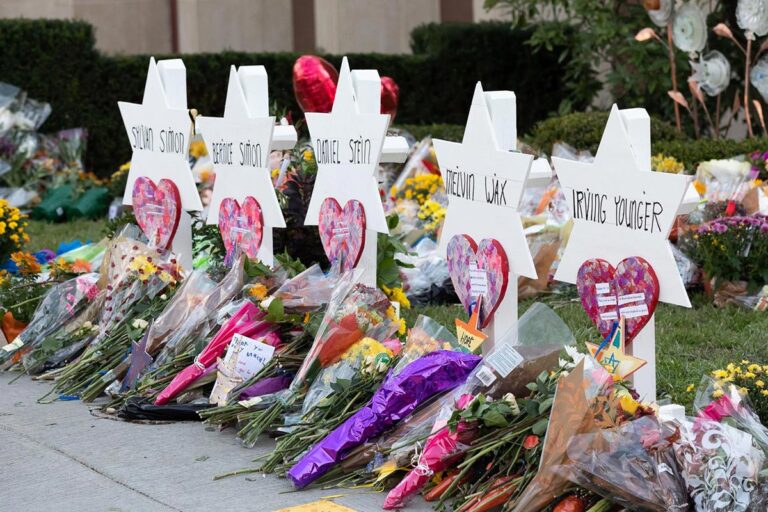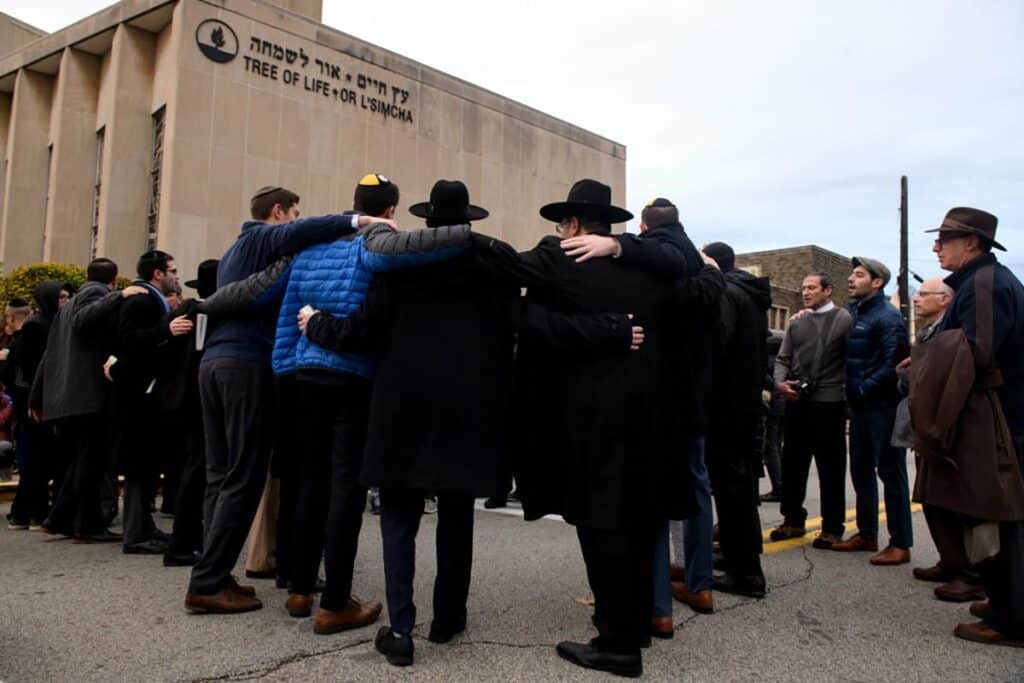
Five years after the heinous crime committed by Robert Bowers, who murdered 11 people and injured six at the Tree of Life Synagogue — the deadliest attack on Jewish people in U.S history — a federal jury unanimously sentenced him to death last Wednesday.
A jury has recommended the death penalty for the man convicted of the deadliest attack on Jewish people in U.S. history — killing 11 worshippers and injuring seven others at a Pittsburgh synagogue in 2018.
— CBS Mornings (@CBSMornings) August 3, 2023
Survivors and victims’ families say it’s a relief. pic.twitter.com/1wrh213xEi
This verdict marks the first instance of capital punishment handed down during the Biden administration, which paused federal executions.
Bowers’ defense attorney, Judy Clarke, pleaded with the jury to show mercy to the Pittsburgh synagogue shooter. Had even one juror opted against the death penalty, Bowers would have instead received life imprisonment without the possibility of parole.
“You’ve held Rob Bowers accountable. You’ve convicted him of 63 counts. You’ve found him eligible for jury sentencing. Now we ask you to choose life and not death,” Clarke said in closing statements.
On the other hand, prosecutors insisted that Bowers’ hate-fueled antisemitic and racist views — coupled with his apparent lack of remorse for the shooting on October 27, 2018, and his conviction on all charges — made a compelling case for capital punishment.
“He turned an ordinary Jewish Sabbath into the worst antisemitic mass shooting in U.S. history, and he is proud of it,” prosecuting attorney Eric Olshan said.
Bowers’ sentence has been met with mixed reactions within the Jewish community — and supporters and opponents alike have drawn on Jewish sources to support their viewpoints. So, we wanted to explore the diverse perspectives and ask: What does Judaism say about the death penalty?
The death penalty in Jewish tradition: A nuanced perspective
Jewish tradition offers a complex stance on the death penalty — one that emphasizes both the gravity of certain crimes and the sanctity of human life.
While the Torah prescribes the death penalty for certain transgressions — and it was sanctioned during the Second Temple period and later, as described in the Talmud — in practice, its application was exceptionally rare. Multiple safeguards were put into place to ensure it was scarcely, if ever, carried out.
Here are some of these key safeguards:
- Only an assembly of 23 judges could decide cases of capital punishment. (Sanhedrin 1)
- The judgment could not be delivered hastily, on the same day the evidence was heard. If it were, the accused would be instantly acquitted. (Sanhedrin 17a)
- At least two witnesses were required to give testimony. (Makkot 6b)
- These witnesses had to warn the person seconds before the act that they were liable for the death penalty. (Sanhedrin 40b)
The Torah lists the death penalty as a consequence for 36 different transgressions, including murder, kidnapping, idol worship, incest, adultery, desecrating Shabbat, and bearing false witness in a capital case.
However, the majority of the Torah’s references to the death penalty relate to instances of murder. Vayikra/Leviticus 24:17 states, “One who kills a human being shall be put to death.” Bereshit/Genesis 9:6 elaborates, “Whoever sheds human blood, by human hands shall that one’s blood be shed, for in the image of God was humankind made.”
The revered medieval scholar Maimonides (Rambam) emphasized the gravity of murder, writing:
“Murder is a sin against fellow man. Anyone who commits this transgression is completely evil. All the mitzvot that he performs throughout his lifetime cannot outweigh this sin nor rescue him from judgment,” (Misheh Torah, Rotseah uShmirat Nefesh 4:9).
Yet, Rambam also underscored the need for caution and the immense responsibility borne by those judging capital cases. He wrote: “It is better and more satisfactory to acquit a thousand guilty persons than to put a single innocent one to death.”
The Mishnah (Makkot 1) reflected this stance, famously stating that a Sanhedrin that puts someone to death once in 70 years is considered destructive.
Interpreting ancient texts in contemporary debates
So, how should we interpret these sources in the debate today?
Those who support the death penalty might argue its legitimacy by pointing to its prescription in the Torah for certain crimes.
Those who oppose the death penalty point out that even if Jewish law allows it in theory, the stringent safeguards made its implementation extremely rare. This underscores a profound reluctance within Judaism to take a life.
Those who take a middle-ground position acknowledge the stringent safeguards in Jewish law. They argue for a more limited, but not entirely abolished, use of the death penalty in modern legal systems.
To sum all of this up, while the death penalty remains a contentious issue in many societies today, Jewish tradition reminds us of the gravity of taking a life and the importance of approaching such decisions with caution, introspection, and a deep reverence for life.
Meanwhile, in Israel, the death penalty is used sparingly, reserved for the most extreme crimes. Only two executions have taken place in the nation’s history. Adolf Eichmann, a convicted Nazi war criminal, was the only person to face a civil execution in 1962.
The other execution was Meir Tobianski, an army major who was court-martialed and convicted of treason during the 1948 Arab-Israeli War, only to be exonerated posthumously.
Diversity of perspectives: Do Jews support the death penalty?
As with most issues, public opinion polls show that there is no single “Jewish” way of thinking about the death penalty.
A 2016 Gallup Poll found that most Jews, 54%, believe that the death penalty is “morally acceptable.” Jews were the least likely of all major religious groups in the U.S. to endorse this view, with 79% of Mormons, 66% of Protestants, and 61% of Catholics saying it was “morally acceptable.”
However, a survey conducted by the Public Religion Institute in 2014 showed that most Jews, 57%, favored life imprisonment over the death penalty for individuals convicted of murder, compared to 33% who advocated for the death penalty.
What about the different religious movements?
The Orthodox Movement does not have an official policy on the issue, and interpretations and viewpoints can vary considerably between different communities and rabbis.
On one end of the spectrum, Rabbi Ahron Soloveichik, a prominent figure within the Orthodox movement, wrote that, “from a halachic point of view, every Jew should be opposed to capital punishment.”
“It is true…that the Torah recognizes capital punishment. However, the Torah delegates the authority to mete out capital punishment only to Sanhedrin, not to anyone else,” he added.
On the other hand, Rabbi Moshe Feinstein suggested his support for the death penalty in certain cases, writing, “One who murders because the prohibition to kill is meaningless to him, and he is especially cruel…[the courts] would judge [capital punishment] to repair the issue [and] to prevent murder — for this [action of the court] saves the state.” (Responsa Iggerot Moshe, Choshen Mishpat v. 2 responsum 68)
In 2004, the Orthodox Union’s Nathan Diament proposed to halt all capital punishment until necessary reforms could be put in place to eliminate racial bias in death penalty verdicts. In the U.S., 75% of executions for murder concern cases where the victim was white, even though roughly half of all homicide victims in America are Black.
Meanwhile, the Conservative Movement’s law committee has officially opposed the death penalty since 1960.
“Too often we learn of people who were convicted of crimes, and only later are new facts uncovered by which their innocence is established. The doors of the jail can be opened — in such cases we can partially undo the injustice. But the dead cannot be brought back to life again. We regard all forms of capital punishment as barbaric and obsolete,” Rabbi Ben Zion Bokser wrote in the movement statement.
The Reform Movement also officially opposes the death penalty, writing in 1959, “In light of modern scientific knowledge and concepts of humanity, the resort to or continuation of capital punishment either by a state or by the national government is no longer morally justifiable.”
How has the Jewish community reacted to the Pittsburgh synagogue shooter’s death penalty sentence?

The verdict was met with a range of responses from the Jewish community. World Jewish Congress president Ronald Lauder applauded the ruling, stating that the decision “represents a measure of justice for the slaughter of 11 Jewish worshippers…the deadliest act of antisemitism in U.S. history.”
Anti-Defamation League director Jonathan Greenblatt agreed, telling i24 News, “This verdict will not bring back the 11 people we lost…and yet, this is justice for those people. This shows that our legal system in America will hold accountable those who commit such ugly acts of violence, and for that I am grateful.”
Most of the families who lost loved ones during the 2018 shooting agreed. In 2021, seven out of the nine families wrote to Attorney General Merrick Garland advocating for a death penalty sentence for Bowers.
Bowers not receiving the death penalty, they wrote, “would be a grave injustice as well as a disservice to the lives, legacies and memories of our deceased family members and to us.”
On the other hand, Rabbi Jonathan Perlman of the Conservative New Light Congregation, who survived the synagogue shooting, voiced his opposition to the ruling.
“Despite the horrific nature of his crimes, I do not believe that doing so would bring either justice or peace,” Perlman wrote in an op-ed for The Forward. “Revenge will not bring our slain loved ones back to life. And seeking it may even hurt ourselves and extend our sadness.”
Beth Kissileff, editor of a book about the Tree of Life tragedy, agreed, asserting in a New York Times op-ed, “Jews believe in the sanctity of life…All human life is said to encompass a whole world. Jewish practice as I understand it does not — outside of self-defense — allow humans to take the lives of other humans. Not even the life of a murderer whose guilt is beyond doubt.”
However, Jeffrey Myers, the rabbi of the Tree of Life Congregation who survived the attack, welcomed the ruling, telling CBS News, “Today we received an immense embrace from the halls of justice around all of us, to say our government does not condone antisemitism in this most vile form that we’ve witnessed.”
Originally Published Aug 7, 2023 06:24PM EDT